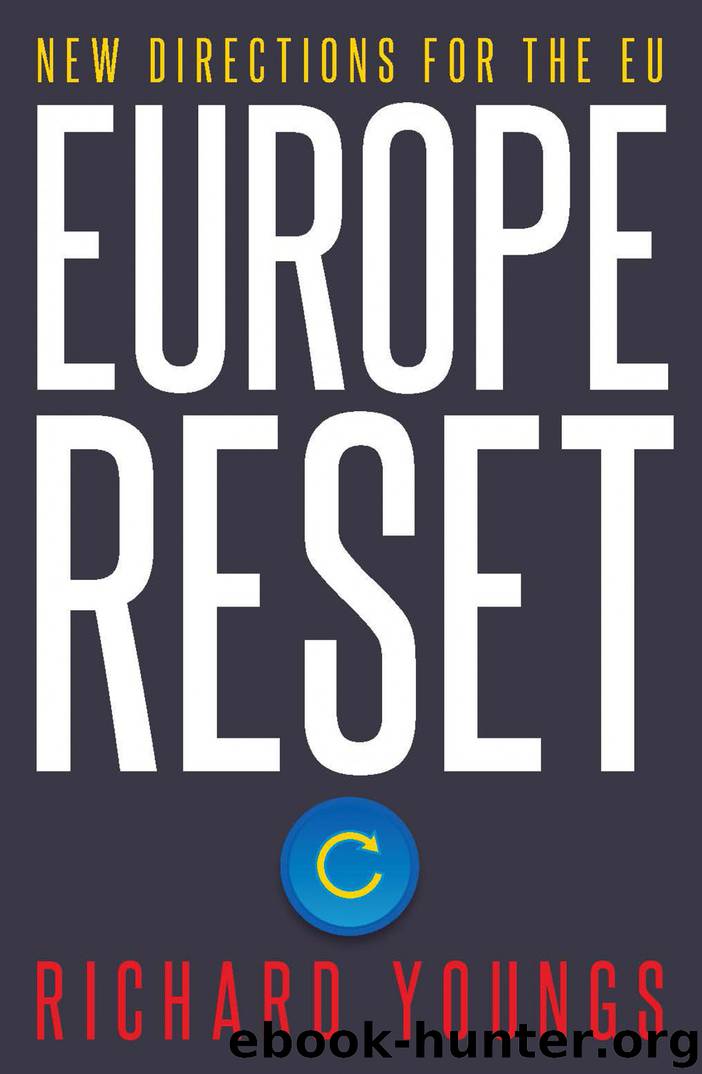Europe Reset by Youngs Richard

Author:Youngs, Richard
Language: eng
Format: epub
Tags: politics;current affairs;international relations;European Union;Brexit;Europe;defence;security;intelligence;democracy
Publisher: I.B. Tauris
Published: 2017-09-29T17:55:47+00:00
A Compact of European Citizens
What then is the way forward? We have seen that many civic initiatives, within the familiar EU framework, are highly promising but arguably not innovative enough. We have also seen that recent trends in civic empowerment provide a propitious context for different kinds of citizen involvement – with this potential still relatively untapped within EU debates. A radical and mould-breaking set of initiatives is required, and civic trends make this increasingly possible. The EU’s remodelled future should be mapped out through a Compact of European Citizens.
This initiative would draw from a number of core principles and approaches. Unlike the standard range of reform pleas, this Compact would dovetail with incipient social trends. It would not simply be launched with groundless hope, in a societal vacuum. Rather, it would be consistent with ongoing social and organisational changes within many communities across Europe. It would also resonate with and be able to draw from a raft of new thinking about democratic quality and effectiveness.
The Compact would not be about magically conjuring consensus out of divergence. The EU does much, admirably, to seek consensus – between nations, between different sectors of society, between faiths. But this is often the consensus of expedient and superficial convenience. European cooperation needs to be rooted in a deeper notion of dialogue that finds mutually acceptable ways of managing diversity and means to express solidarity that are compatible with citizens adopting different policy choices. The Compact would not be about simply substituting easily assumed citizen consensus for government bickering.
The aim must be to combine a reclaiming of powers from the abiding ethos of EU institutional centralism with a thicker form of democratic citizenship carried out in practical ways across borders. Political thinkers have talked for a long time about ‘Europe’ needing to be defined not in terms of a fixed set of institutions but as an idea – a set of values that are flexible and open, and capable of rooting a notion of integration that is no longer about replicating a uniform set of nation state-like practices. The Compact would echo and borrow from the emergent model of ‘monitory democracy’ – scrutiny outside the channels of formal representative bodies, which underperform in the context of EU decision-making.38
The Compact would also be able to encompass emerging ideas about ‘deliberative democracy’. Sceptics have tended to dismiss the whole notion of deliberative democracy as overly idealistic, pointing out that political reality is a long way short of the conditions needed to make deliberation work perfectly – since, as doubters claim, citizens are not interested in more engagement, rarely think beyond their own narrow interests and do not come together on equal terms. In response, theorists have suggested a more modest concept of deliberative democracy: not a perfect absolute, but mini-public forums serving as loose brainstorming opportunities that then filter into representative bodies.39 This should be the kind of feasible model that inspires the Compact of European Citizens.
The Compact would also take on board the practice of ‘sortition’, which has been gaining support in recent years.
Download
This site does not store any files on its server. We only index and link to content provided by other sites. Please contact the content providers to delete copyright contents if any and email us, we'll remove relevant links or contents immediately.
The Meaning of the Library by unknow(2560)
Six Billion Shoppers by Porter Erisman(2292)
Why Nations Fail: The Origins of Power, Prosperity, and Poverty by Daron Acemoglu & James Robinson(2276)
No Time to Say Goodbye(2108)
Red Notice by Bill Browder(2068)
Currency Trading For Dummies by Brian Dolan(1919)
The Economist [T6, 22 Thg9 2017] by The Economist(1914)
Thank You for Being Late by Thomas L. Friedman(1762)
Bitcoin: The Ultimate Guide to the World of Bitcoin, Bitcoin Mining, Bitcoin Investing, Blockchain Technology, Cryptocurrency (2nd Edition) by Ikuya Takashima(1688)
Amazon FBA: Amazon FBA Blackbook: Everything You Need To Know to Start Your Amazon Business Empire (Amazon Empire, FBA Mastery) by John Fisher(1559)
Coffee: From Bean to Barista by Robert W. Thurston(1521)
The Future Is Asian by Parag Khanna(1477)
The Great Economists by Linda Yueh(1447)
How Money Got Free: Bitcoin and the Fight for the Future of Finance by Brian Patrick Eha(1417)
Grave New World by Stephen D. King(1414)
Pocket World in Figures 2018 by The Economist(1406)
Capitalism Without Capital: The Rise of the Intangible Economy by Jonathan Haskel(1389)
The Sex Business by Economist(1374)
Cultural Intelligence by David C. Thomas(1286)
